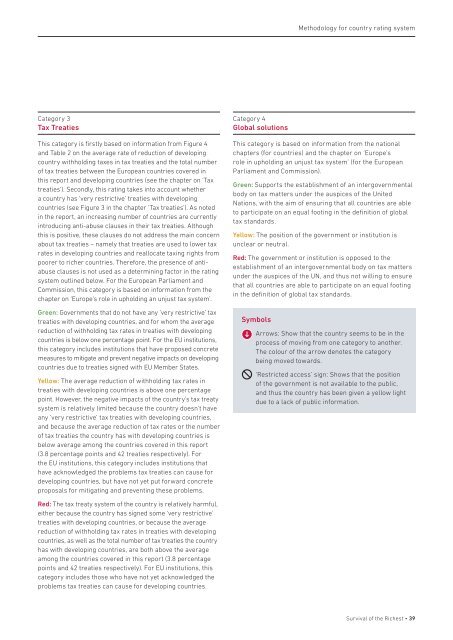You also want an ePaper? Increase the reach of your titles
YUMPU automatically turns print PDFs into web optimized ePapers that Google loves.
Methodology for country rating system<br />
Category 3<br />
Tax Treaties<br />
This category is firstly based on information from Figure 4<br />
and Table 2 on <strong>the</strong> average rate <strong>of</strong> reduction <strong>of</strong> developing<br />
country withholding taxes in tax treaties and <strong>the</strong> total number<br />
<strong>of</strong> tax treaties between <strong>the</strong> European countries covered in<br />
this report and developing countries (see <strong>the</strong> chapter on ‘Tax<br />
treaties’). Secondly, this rating takes into account whe<strong>the</strong>r<br />
a country has ‘very restrictive’ treaties with developing<br />
countries (see Figure 3 in <strong>the</strong> chapter ‘Tax treaties’). As noted<br />
in <strong>the</strong> report, an increasing number <strong>of</strong> countries are currently<br />
introducing anti-abuse clauses in <strong>the</strong>ir tax treaties. Although<br />
this is positive, <strong>the</strong>se clauses do not address <strong>the</strong> main concern<br />
about tax treaties – namely that treaties are used to lower tax<br />
rates in developing countries and reallocate taxing rights from<br />
poorer to richer countries. Therefore, <strong>the</strong> presence <strong>of</strong> antiabuse<br />
clauses is not used as a determining factor in <strong>the</strong> rating<br />
system outlined below. For <strong>the</strong> European Parliament and<br />
Commission, this category is based on information from <strong>the</strong><br />
chapter on ‘Europe’s role in upholding an unjust tax system’.<br />
Green: Governments that do not have any ‘very restrictive’ tax<br />
treaties with developing countries, and for whom <strong>the</strong> average<br />
reduction <strong>of</strong> withholding tax rates in treaties with developing<br />
countries is below one percentage point. For <strong>the</strong> EU institutions,<br />
this category includes institutions that have proposed concrete<br />
measures to mitigate and prevent negative impacts on developing<br />
countries due to treaties signed with EU Member States.<br />
Yellow: The average reduction <strong>of</strong> withholding tax rates in<br />
treaties with developing countries is above one percentage<br />
point. However, <strong>the</strong> negative impacts <strong>of</strong> <strong>the</strong> country’s tax treaty<br />
system is relatively limited because <strong>the</strong> country doesn’t have<br />
any ‘very restrictive’ tax treaties with developing countries,<br />
and because <strong>the</strong> average reduction <strong>of</strong> tax rates or <strong>the</strong> number<br />
<strong>of</strong> tax treaties <strong>the</strong> country has with developing countries is<br />
below average among <strong>the</strong> countries covered in this report<br />
(3.8 percentage points and 42 treaties respectively). For<br />
<strong>the</strong> EU institutions, this category includes institutions that<br />
have acknowledged <strong>the</strong> problems tax treaties can cause for<br />
developing countries, but have not yet put forward concrete<br />
proposals for mitigating and preventing <strong>the</strong>se problems.<br />
Category 4<br />
Global solutions<br />
This category is based on information from <strong>the</strong> national<br />
chapters (for countries) and <strong>the</strong> chapter on ‘Europe’s<br />
role in upholding an unjust tax system’ (for <strong>the</strong> European<br />
Parliament and Commission).<br />
Green: Supports <strong>the</strong> establishment <strong>of</strong> an intergovernmental<br />
body on tax matters under <strong>the</strong> auspices <strong>of</strong> <strong>the</strong> United<br />
Nations, with <strong>the</strong> aim <strong>of</strong> ensuring that all countries are able<br />
to participate on an equal footing in <strong>the</strong> definition <strong>of</strong> global<br />
tax standards.<br />
Yellow: The position <strong>of</strong> <strong>the</strong> government or institution is<br />
unclear or neutral.<br />
Red: The government or institution is opposed to <strong>the</strong><br />
establishment <strong>of</strong> an intergovernmental body on tax matters<br />
under <strong>the</strong> auspices <strong>of</strong> <strong>the</strong> UN, and thus not willing to ensure<br />
that all countries are able to participate on an equal footing<br />
in <strong>the</strong> definition <strong>of</strong> global tax standards.<br />
Symbols<br />
Arrows: Show that <strong>the</strong> country seems to be in <strong>the</strong><br />
process <strong>of</strong> moving from one category to ano<strong>the</strong>r.<br />
The colour <strong>of</strong> <strong>the</strong> arrow denotes <strong>the</strong> category<br />
being moved towards.<br />
‘Restricted access’ sign: Shows that <strong>the</strong> position<br />
<strong>of</strong> <strong>the</strong> government is not available to <strong>the</strong> public,<br />
and thus <strong>the</strong> country has been given a yellow light<br />
due to a lack <strong>of</strong> public information.<br />
Red: The tax treaty system <strong>of</strong> <strong>the</strong> country is relatively harmful,<br />
ei<strong>the</strong>r because <strong>the</strong> country has signed some ‘very restrictive’<br />
treaties with developing countries, or because <strong>the</strong> average<br />
reduction <strong>of</strong> withholding tax rates in treaties with developing<br />
countries, as well as <strong>the</strong> total number <strong>of</strong> tax treaties <strong>the</strong> country<br />
has with developing countries, are both above <strong>the</strong> average<br />
among <strong>the</strong> countries covered in this report (3.8 percentage<br />
points and 42 treaties respectively). For EU institutions, this<br />
category includes those who have not yet acknowledged <strong>the</strong><br />
problems tax treaties can cause for developing countries.<br />
<strong>Survival</strong> <strong>of</strong> <strong>the</strong> <strong>Richest</strong> • 39


